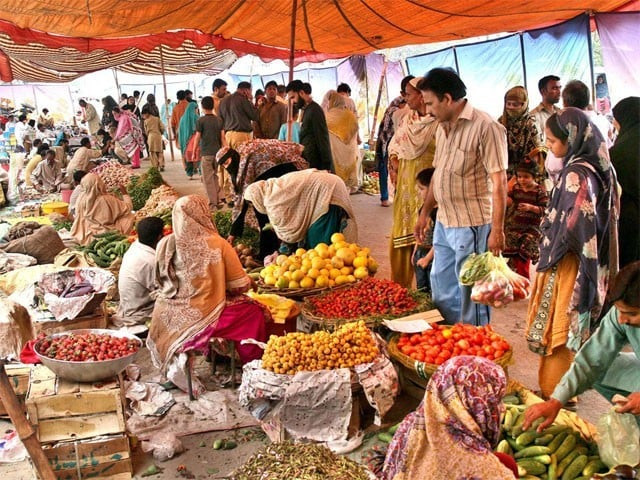In Punjab, district administration fails to make all Ramazan bazaars operational
Prices of essential commodities, including fruits and vegetables, have multiplied

PHOTO:FILE
A survey of different Ramazan-cum-Sunday bazaars revealed that the district administration was so ill-prepared in setting up these markets that even on the very first day it failed to issue a pricelist , something that has been the norm during the tenure of the previous government.
The prices of all essential commodities, including fruits, vegetables, grains and pulses have already multiplied in the absence of an efficient and effective price control mechanism.
In addition, massive price distortion, to match the prices of the Pakistan Muslim League-Nawaz (PML-N) government, has made it difficult for the government to ensure the availability of several commodities at Ramazan bazaars. For example, in several Ramazan bazaars, the agriculture marketing department had to do rationing of the onion sale owing to limited availability of stocks.
Citizens complained that it was the beginning of the holy month and long queues were being witnessed at Ramazan bazaars where citizens were lining up to purchase onions. The government has fixed the price of onion at Rs23 per kilogramme at the agriculture marketing department’s stall, while the same was sold for Rs49 per kilogramme at other stalls. In open markets, onion is available for Rs60 per kilogramme.
Lemon, which is a popular ingredient used in refreshing drinks during Ramazan and summer, is also only being sold at government stalls. The subsidised price of lemon is fixed at Rs149 per kilogramme at government stalls, Rs313 per kilogramme at private stalls and Rs400 per kilogramme in open markets.
Govt to regulate quality, prices at Ramazan bazaars
Though, the official price fixed by the market committee was Rs308 per kilogramme. Such is the situation of other commodities in Ramazan bazaars and long queues were seen in front of government stalls.
The official pricelist showed that an increase of Rs7 was witnessed in the onion price during the last seven days. Tomato’s price was fixed at Rs49 per kilogramme. In several areas greengrocers sold tomato for Rs55-60 per kilogramme. Local garlic price remained stable at Rs91 to Rs97 per kilogramme in the official pricelist, however, it was sold for Rs110-120 per kilogramme in the provincial capital. Chinese ginger was not available in Ramazan bazaars, however its price was fixed at Rs195 per kilogramme. Thai garlic price was fixed at Rs156 per kilogram me but it was traded for Rs190-195 a kilogramme.
Bitter gourd price was fixed at Rs38-40 per kilogramme but was sold for Rs55-60 per kilogramme. Spinach price was fixed at Rs14-15 per kilogramme and sold for Rs30 per kilogramme. Methi’s price was fixed at Rs38-40 per kilogramme, sold at Rs60 per kilogramme.
Cauliflower and cabbage prices were fixed at Rs48-50 and Rs53-55 per kilogramme respectively but both commodities were not sold at Ramazan bazaars. Pumpkin price was increased by Rs9 per kilogramme and fixed at Rs60.
Green chili price was fixed at Rs48-50 per kilogram, but it was sold for Rs80 per kilogramme. Radish price was fixed Rs15 per kilogramme and sold for Rs40 per kilogramme. Carrot price was set at Rs23-25 but was not sold at Ramazan bazaars.
The prices of different varieties of apples was fixed at Rs82 to Rs310 per kilogramme, while for lower quality apples it was fixed at Rs100 per kilogramme. The price of A-quality banana witnessed an increase of Rs5 per dozen, fixed at Rs105-110 per dozen, while lower grade banana price was fixed at Rs58 to Rs60 per dozen.
Guava price remained stable at Rs50-52 per kilogramme, but it was not available in Ramzan bazaars. Papaya was fixed at Rs87-90 per kilogramme and sold for Rs140 a kilogramme. Dates price were fixed at Rs130-135 per kilogramme but sold for Rs300-500 per kilogramme depending on the quality of produce.
Meanwhile, Punjab Chief Secretary Yousaf Naseem Khokhar said that like Ramazan bazaars, the availability of daily-use commodities at fixed prices would also be ensured in open markets and stern action would be taken against profiteers and hoarders.
Sans supplies, Ramazan bazaars pop up
He directed that separate queues for elderly persons be made in Ramazan bazaars so that they do not face any problems. During his ‘surprise visit’ to Shadman Ramzan bazaar, the Chief Secretary said that the Punjab government was giving huge subsidy on essential items to provide relief to common man. He directed that as well as prices strict check be kept on quality, supply and demand to avoid shortage of any commodity during the holy month of Ramazan.
The chief secretary inspected different stalls and asked consumers about the quality and the prices of eatables. He also issued instructions regarding cleanliness at Ramazan bazaars. He ordered that the number of counters be increased. He said arrangements at Ramazan bazaars would be reviewed on a daily basis, adding directions have been issued to all officers to conduct regular visits and no negligence would be tolerated in this regard.
The officers, who will show good performance, would be encouraged, he mentioned. Talking to media, the CS said a strategy was evolved to phase out polythene bags as these are causing environmental pollution. He urged citizens to use cloth bags instead of polythene bags.
In response to a query, he said that the number of price control magistrates increased in the province for effective monitoring of prices and concrete measures for price control would continue after Ramazan.
Published in The Express Tribune, May 6th, 2019.



















COMMENTS
Comments are moderated and generally will be posted if they are on-topic and not abusive.
For more information, please see our Comments FAQ